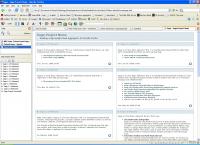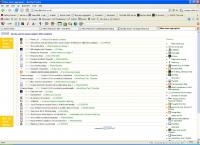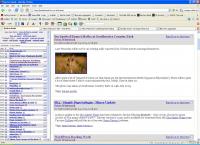As I get more and more into blogging I have seen the number of different feeds that I read on a daily basis wax and wane a fair bit. For a while I have played with a number of different desktop based feed readers and more recently web based feed readers. It is now over a year since I started reading blogs on a daily basis and the following article chronicles my journey through a number of feed readers.
 If I remember correctly I started with Sage. Sage was very easy to use and it was good at keeping track of what articles I had/hadn’t read and provided a nice look-and-feel to the feed display.
If I remember correctly I started with Sage. Sage was very easy to use and it was good at keeping track of what articles I had/hadn’t read and provided a nice look-and-feel to the feed display.
I stuck with Sage for quite a while but it didn’t quite hit the spot with regard to integrating the tracking of a large number of feeds. I found myself frustrated by the process of switching between the different feeds to read the new items – what was missing for me was an integrated view with the unread posts in chronological order – In other words you have to read through a feed at a time which involves a lot of switching around the UI and can suck up a lot of precious feed reading time.
While still using Sage I played with a number of the other desktop based feed readers and I believe at some point in time I installed, in no particular order, at least the following list: FeedDemon, SharpReader, Ampheta Desk, and Mozilla Firefox.
The main problem I had with all of the above feed readers is the inability for me to be able to keep track of my subscriptions and what I had read in all the locations where I get the chance to check up on a read feeds (On a usual day I will read my feeds from at least my desktop pc at home and at my pc at work. On occasions I will also checkup while sitting in the lounge/garden using my laptop.).
This lack of location independence was frustrating – for a time this led to me giving up on feed readers completely and relying on a bookmark folder in Firefox which I would occasionally “open in tabs” and try and catch up on the latest posts. This list of blogs was then synchronised between my many installs of Firefox courtesy of del.icio.us and foxylicious. The somewhat laborious feed reading method really increased the amount of time it took to keep track of updates.
 All of this changed about 2/3 months ago when I was introduced to lilina. Which to shamelessly quote its website is
All of this changed about 2/3 months ago when I was introduced to lilina. Which to shamelessly quote its website is a simple but powerful news aggregator written in PHP. No database is needed, RSS/ATOM parsing is done by the excellent MagpieRSS library (it is included, no additional installation needed). It features feed auto-discovery and an easy-to-use interface.
. This seemed to solve all my problems, I now had a central, single place where I could read my feeds from and keep track of my subscriptions. I thought I was happy at last :-).
However, over time it became a little frustrating to use – because there was no way of keeping track of what you had/hadn’t read the time taken up by feed reading started to increase again and I began to wonder if I needed to sit down and start to craft my own simple web based feedreader glueing together MagpieRSS with a mysql db to keep track of what I had/hadn’t read and a simple web interface.
 Then recently, while reading through the comments on the slashdot post on Atom 1.0 vs RSS 2.0, I came across feed on feeds. Looking through the site it looked like this would be an improvement over lilina so I set about installing and importing my opml file directly from lilina (I just love open formats and standards ;-)).
Then recently, while reading through the comments on the slashdot post on Atom 1.0 vs RSS 2.0, I came across feed on feeds. Looking through the site it looked like this would be an improvement over lilina so I set about installing and importing my opml file directly from lilina (I just love open formats and standards ;-)).
A week later I am very impressed – feedonfeeds achieves the one thing really missing from lilina to complete my feed browsing experience. It successfully keeps track of what is read/unread. So far my experiences have been wholly positive the count of feeds I am currently reading has risen from about 35 to nearly 45 and I am spending much less time keeping track of what I have/haven’t read and much more time reading. I would estimate that the amount of time I now spend reading the feeds has halved due to my improved workflow.

The obvious question seems to be: why not Bloglines??
Pingback: Peter Westwood » Optimising Feed Reading Redux
Have you tried to use Gregarius? It is a nice feed reader similar to feedonfeeds. Looks prettier and is under active development.
I like your preview for comments. Nice.!!
Gregarius looks very interesting – similar is style to feedonfeeds by much nicer on the eyes. I will have to have a play with it and see how it compares!
Nice to see that it is following some of the WordPress design principles and has similar plugin support.
Pingback: Peter Westwood » feedonfeedredux